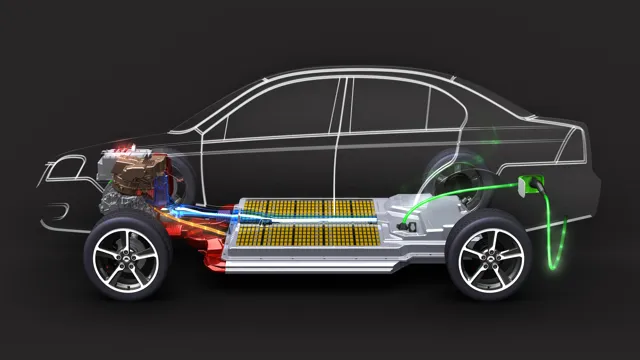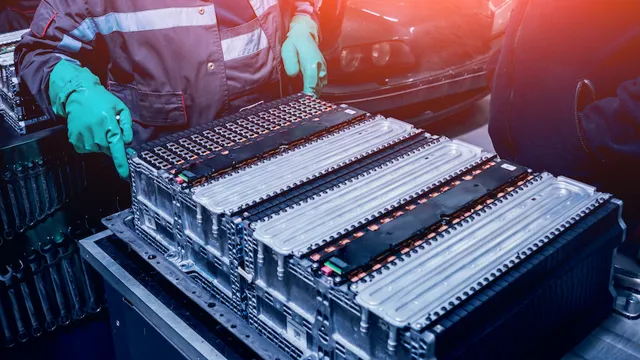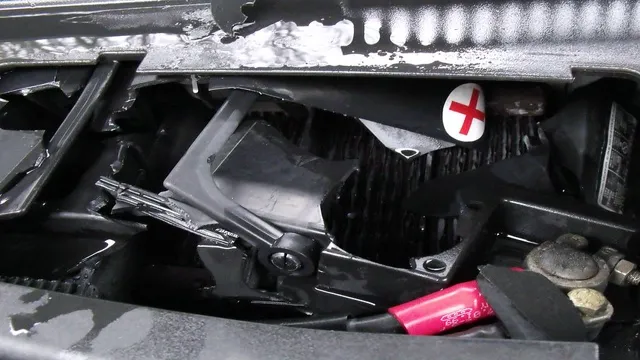The Power Within: All About the Revolutionary Batteries of Electric Cars!
Electric cars have come a long way since their invention over a century ago. From their earliest prototypes that were clunky, loud and had limited range, electric cars are now sophisticated and efficient vehicles boasting long battery range and great performance. But what about the batteries that power them? Electric car batteries have undergone a significant evolution since their inception and continue to experience advancements that make them increasingly efficient and cost-effective.
Today’s electric car batteries are vastly superior to those of the past, courtesy of innovative technologies that optimize energy storage and extend battery life. For instance, the decline in the cost of Lithium-ion batteries over the years has made them the go-to option for most electric car manufacturers. These batteries can store significantly more energy per kilogram than traditional lead-acid batteries, promising greater range per charge.
Moreover, advancements in battery cooling and heating systems now ensure that Lithium-ion batteries are better equipped to function optimally in extreme weather conditions. This is especially important for electric cars, which rely on batteries to power their engines. As a result, electric cars can now operate efficiently for longer, whether it’s hot or cold outside.
In conclusion, the evolution of electric car batteries is a testament to how cutting-edge technology has the power to revolutionize the automotive industry. Electric car manufacturers are already pushing the envelope with battery innovation, tantalizing the horizon with ideas like solid-state batteries, which promise even more energy density and faster charging times. It’s a thrilling time to watch the evolution of electric car batteries unfold, and the future looks brighter than ever.
Types of Electric Car Batteries
When it comes to electric cars, there are different types of batteries that power them. The most common type is the lithium-ion battery, which is known for its high energy density, long lifespan, and relatively low cost. Another type of battery is the nickel-metal hydride (NiMH) battery, which has been used in hybrid cars for many years.
While NiMH batteries aren’t as energy-dense as lithium-ion batteries, they are still relatively affordable and have a longer lifespan than other types of batteries. Finally, there are also solid-state batteries, which are still in the experimental stage but have the potential to revolutionize the electric car industry. These batteries use solid electrolytes instead of liquid ones, which could significantly increase their energy density and recharge time.
Overall, the battery of electric cars is a crucial component that directly affects their performance, lifespan, and cost. With the rise of electric vehicles, the development of better and more efficient batteries is crucial for the future of sustainable transportation.
Lithium-Ion Batteries
Lithium-Ion Batteries Electric cars have come a long way since their inception, and one of the critical components that make them work is the battery. Currently, there are different types of electric car batteries available in the market, and one of the most commonly used is the lithium-ion battery. These batteries provide high energy density, and their low self-discharge ensures they remain charged for a more extended period.
Additionally, lithium-ion batteries are durable and have a long lifespan, making them a popular choice for electric cars. Another advantage of lithium-ion batteries is that they are lightweight, which can significantly reduce the weight of an electric car, improving its overall performance. However, as with all batteries, lithium-ion batteries do have their disadvantages, including high production costs and the possibility of overheating and bursting under specific conditions.
Despite these drawbacks, lithium-ion batteries are currently the most prevalent type of battery used in electric cars and are powering the transition to a more sustainable future.
Nickel-Metal Hydride Batteries
Nickel-Metal Hydride Batteries are one of the many types of electric car batteries available in the market. These batteries use a combination of nickel and metal hydride to store energy and are a popular alternative to lead-acid batteries. While they have a lower energy-to-weight ratio than lithium-ion batteries, they last longer and are much safer to use.
Nickel-Metal Hydride Batteries are also more affordable and have a greater tolerance for environmental factors such as extreme temperatures. These batteries are commonly used in hybrid electric vehicles and are still considered a reliable and efficient option for electric cars. In terms of their environmental impact, Nickel-Metal Hydride Batteries are not as eco-friendly as some of their counterparts due to the materials used in their manufacturing process.
Nevertheless, they remain a viable and popular choice for many drivers looking for a cost-effective and practical solution to power their electric cars.
Solid-State Batteries
When it comes to electric car batteries, there are several different types that are available on the market. One of the most exciting developments in recent years is the introduction of solid-state batteries. Unlike traditional lithium-ion batteries, solid-state batteries use a solid electrolyte instead of a liquid one.
This not only makes them safer and more stable, but it also improves their energy density and charging capacity. Solid-state batteries can hold more energy in a smaller space, which means that they can power electric cars for longer distances without needing to be recharged. Additionally, these batteries can charge much faster than traditional lithium-ion batteries, reducing the time required for recharging.
While solid-state batteries are still in the experimental stage, many automakers and researchers are working to perfect the technology. These batteries have the potential to revolutionize the electric car industry, making electric vehicles more practical and convenient for everyday use. As the technology continues to develop, we can expect to see solid-state batteries powering more and more electric cars in the future.
Battery Life and Performance
If you are considering purchasing an electric car, you may be wondering about the battery life and performance. The battery of electric cars is a crucial component that can greatly impact the overall performance and driving experience. One of the most significant factors affecting battery life is the driving style.
Aggressive acceleration, excessive use of air conditioning or heating and fast driving speeds can all reduce the battery life. Additionally, extreme temperatures can also impact battery performance, so it’s crucial to store the car in a moderate temperature environment. Many electric car manufacturers offer various tools and features to help drivers monitor the battery status and maximize battery life.
It’s worth researching different models and options to ensure you choose an electric car that suits your driving style and meets your needs. With the right care and maintenance, an electric car battery can last for several years, providing you with reliable and efficient transportation.
Factors Affecting Battery Life
Battery life and performance are major concerns when it comes to electronic devices. Several factors can affect the lifespan and efficiency of a battery. One of the main factors is the device’s usage patterns.
How much time you spend on your device with activities such as streaming, browsing, or gaming can impact battery life. Another key factor is the environmental conditions surrounding the device. High temperatures can cause batteries to degrade faster, affecting their power and overall performance.
Additionally, the age of the battery itself can have an impact on its lifespan and performance. As a battery ages, it can no longer hold as much charge, leading to shorter battery life. By paying attention to these factors and making adjustments to usage habits, consumers can help extend the life and performance of their device’s battery.
EV Range and Charging Time
When it comes to EVs, one of the biggest concerns is the range and charging time. A car’s battery life and performance play a crucial role in determining how far you can go on a single charge and how quickly you can recharge your vehicle. The battery’s capacity and chemistry determine the amount of power it can hold and how quickly it can be charged.
Battery life can be affected by a variety of factors, including temperature, usage, and charging habits. If you frequently charge your vehicle to 100%, it can reduce the battery’s lifespan due to the increased stress on the cells. On the other hand, charging your EV to 80% can help extend the battery’s life.
When it comes to performance, EVs have come a long way in recent years. Today’s electric vehicles have a range of up to 400 miles on a single charge, and new advancements are constantly being made to increase this range. However, the range can vary depending on the driving conditions, terrain, and speed.
Charging time is also an important consideration when it comes to EVs. While some charging stations can provide a full charge in as little as 30 minutes, others can take several hours to reach a full charge. It’s important to consider your daily driving habits and charging accessibility when choosing an EV.
Overall, battery life and performance are crucial factors when it comes to EVs. With advancements in technology, EVs are becoming more efficient and practical for daily use. By understanding the various factors that impact battery life and performance, you can make an informed decision when it comes to choosing an EV that meets your needs and expectations.
Advancements in Battery Technology
The battery technology of electric cars has come a long way in recent years, thanks to advancements in materials and manufacturing processes. Lithium-ion batteries are the current standard for most electric vehicles, providing longer ranges and better performance than previous generations. But researchers are also exploring new types of batteries that could push the boundaries even further.
For example, solid-state batteries offer the potential for even higher energy densities and faster charging times, while also being safer and more environmentally friendly. Meanwhile, flow batteries could be a game-changer for larger vehicles and stationary energy storage, allowing for unlimited range and flexible charging options. As these new technologies continue to develop, the battery of an electric car could become a true marvel of engineering, able to power us on our daily commutes and beyond.
Graphene Batteries
Advancements in Battery Technology have led to the development of graphene batteries, which are set to revolutionize energy storage. Graphene is a material consisting of a single layer of carbon atoms arranged in a hexagonal lattice. It is known for its exceptional properties, such as high conductivity and strength, making it an ideal candidate for battery applications.
Graphene batteries can charge faster, last longer, and are more environmentally friendly. In addition, they are much smaller and lighter than traditional lithium-ion batteries, which makes them suitable for use in portable electronic devices. Moreover, Graphene batteries are expected to lead to new technologies, like electric cars that can travel hundreds of miles on a single charge.
While there’s still work to be done before these batteries reach mass production and become readily available, they hold great promise for a future powered by renewable energy sources.
Silicon Anode Batteries
Silicon anode batteries are a significant advancement in battery technology. Traditional lithium-ion batteries use graphite anodes, which limit their capacity and ability to store a charge. However, by replacing graphite with silicon, batteries can store up to ten times more charge, making them more efficient and effective.
This is due to the higher energy density of silicon, which allows for more storage capacity and faster charging times. Furthermore, silicon anode batteries are also more environmentally friendly, as silicon is abundant and easier to extract than graphite, reducing the carbon footprint of battery production. This innovation in battery technology holds enormous potential, especially for industries that rely heavily on energy storage, such as electric vehicles and renewable energy.
By utilizing silicon anode batteries, we can reduce our reliance on fossil fuels and move towards a more sustainable future.
Conclusion: The Future of Electric Car Batteries
In conclusion, it’s clear that the battery is the beating heart of an electric car, providing the necessary energy to power its impressive performance. Just like the heart in our bodies, a healthy battery is essential for a happy and fulfilling life on the road. And just as we take care of our hearts by eating well and exercising, it’s important to maintain and recharge our electric car batteries to ensure maximum efficiency and longevity.
So let’s all raise a toast to the unsung hero of the electric car – the battery! May it continue to give us the power we need, whenever and wherever we need it. Cheers!”
FAQs
How long does it take to fully charge the battery of an electric car?
The time required to fully charge an electric car battery depends on various factors such as the size of the battery, the charging rate, and the available infrastructure. Typically, it takes 30 minutes to several hours to charge an electric car battery fully.
Can I charge an electric car battery with a regular wall socket?
Yes, you can charge an electric car battery with a regular wall socket. However, it will take much longer to charge the battery than with a dedicated charging station.
How long does the battery of an electric car last?
The lifespan of an electric car battery varies depending on the make and model of the vehicle, driving habits, and environmental factors. Generally, electric car batteries can last anywhere from 8-10 years with proper care and maintenance.
Can I replace the battery of my electric car?
Yes, you can replace the battery of your electric car. However, it can be expensive, and it is essential to choose the right type and capacity of battery for your car to ensure optimal performance and longevity.







